General
CHUSS Symposium Restores Hope in the Face of Disruptions by the 4IR
Published
6 years agoon
Defined by the symposium brief as the destabilising impact of, especially information mediated reality on account of advances in social media and the Internet, the Fourth Industrial Revolution (4IR) has caused quite a stir in the Humanities and Social Sciences disciplines especially in the face of outward promotion of Science and Technology by projects such as the Uganda Millennium Science Initiative. It was against this background that the College of Humanities and Social Sciences (CHUSS) organised a symposium based on the theme “The Humanities And Social Sciences In The Age Of Disruptions: Policy Challenges, Praxis Benefits And Intellectual Engagements” on 6th March 2018.
Giving an overview of the of the symposium held in the Main Hall, Dr. Edgar Nabutanyi paid tribute to the event sponsors; Gerda-Henkel Stiftung Foundation, for not only offering 30 full PhD Scholarships to students, but also agreeing to re-allocate the balance of funds to sponsoring public debates on issues affecting Humanities and Social Sciences disciplines. Dr. Nabutanyi is the Coordinator of the Gerda-Henkel Stiftung Foundation CHUSS PhD Training Programme.
“This symposium is meant to cause us to ask questions that unpack this age brought about by the Fourth Industrial Revolution. What are the challenges affecting the Humanities and Social Sciences? How can we harness the tools of the Fourth Industrial Revolution to centre Humanities and Social Sciences in the search of answers to the most important questions facing Africa in the 21st Century? Hopefully we shall have more questions than answers at the end of today’s symposium for that is indeed our nature; to question,” remarked Dr. Edgar Nabutanyi.
“Disruptions are not all negative but are instead events that make things happen,” remarked Assoc. Prof. Josephine Ahikire, Deputy Principal CHUSS and Chair of the Symposium Organising Committee. “Humanities and Social Sciences are the pulse of the University and we are planning how best to refashion these disciplines in the new era” she added.
Assoc. Prof. Ahikire went on to say that the Humanities and Social Sciences provide ideational leadership to the university as they are the eyes, ears and hands of society. She called upon PhD Students at the symposium to emulate their leaders in CHUSS.
“We want to leverage our cohort of PhD graduates to strengthen the supervision capacity in the College of Humanities and Social Sciences. I therefore thank all members of the organising committee especially Dr. Edgar Nabutanyi for their hard work that has made this event possible” concluded Assoc. Prof. Ahikire.
In the remarks that followed, the Principal CHUSS-Prof. Edward Kirumira thanked the Guest of Honour, Hon. Dr. John Chrysostom Muyingo, who was represented by the Acting Commissioner for Higher Education, Mr. Mukwatampola Muzamir, for coming to witness the revival of debates at Makerere University as led by CHUSS. He welcomed the keynote speaker and Dean, School of Humanities at the University of Nairobi, Prof. Peter Wasamba and thanked him for taking time off to deliver the address.
“Prof. Peter Wasamba is part of the leadership for the Next Generation of Africa Academics; a program I was privileged to head for seven years, which has trained 16 PhDs at Makerere including Dr. Edgar Natubanyi. He is now giving back by organising such symposia and I thank all colleagues in Administration and at CHUSS for pushing the agenda beyond just training of Masters and PhD students to engaging in intellectual discourse” added Prof. Kirumira.
He paid tribute to the Gerda-Henkel Stiftung Foundation for sponsoring 30 fully paid PhDs in Humanities and Social Sciences, as well as the Andrew Mellon Foundation for an additional 7 PhD scholarships. Prof. Kirumira added that the college is reviving the creation of a community of scholars at Makerere so that individuals who return from their studies do not feel isolated; a factor that will help improve the University’s staff retention statistics.
Prof. Kirumira concluded that the symposium was one way of Makerere; a government institution, providing accountability to the public and the taxpayer. “Stay with us on this journey of taking Makerere to the public and please participate and challenge the presentations: be constructively critical, not destructively critical” he advised.
The Deputy Vice Chancellor (Academic Affairs)-DVCAA, Assoc. Prof. Ernest Okello Ogwang is no stranger to the intense scrutiny directed at the Humanities and Social Sciences in the wake of disruptive digital technology and social media. An accomplished publisher with a PhD in Literature-Folklore from the Indiana University, Bloomington, he started off his remarks by acknowledging the presence of his fellow alumna and Uganda’s first Minister of Women and Development, Hon. Mrs. Joyce Mpanga who graced the symposium.
“The issue of praxis, beyond the ideas in our field is critical. Beyond the classroom and scholarly discussions, it has become imperative that African Humanities and Social Sciences scholars must become active advocates following in the footsteps of Mwalimu Julius Nyerere, Ali Mazrui and Thabo Mbeki, among others,” remarked Assoc. Prof. Okello Ogwang, who also represented the Vice Chancellor, Prof. Barnabas Nawangwe.
Assoc. Prof. Okello Ogwang expressed happiness that the symposium would be immediately followed by a graduate workshop, which would help to inspire and guide the emerging scholars in the field on an appropriate path. “In times when we as scholars of people, society and relationships are being tasked to deliver tangible contributions in the midst of a global technological explosion, we must rise to the challenge and provide irrefutable evidence that indeed the humanities and social sciences are the foundation and basis of all human civilisations” he added.
The DVCAA thanked CHUSS for this timely intervention aimed at fostering the humanities and social sciences and their role in development processes and also appreciated the Gerda-Henkel Stiftung Foundation for sponsoring the symposium.
“I bring greetings from the Ministry of Education and Sports and apologies from the Minister of State for Higher Education Hon. Dr. John Chrysostom Muyingo who was unable to make it today owing to state duties of equally great importance” remarked Mr. Mukwatampola as he prepared to read the Guest of Honour’s remarks.
The Minister’s speech acknowledged that Humanities and Social Sciences are important disciplines in the development of society and symposia act as beacons of hope and conveyor belts to academic excellence for all stakeholders who participate in them. On behalf of the Government, he extended his appreciation to the Gerda-Henkel Stiftung Foundation for the financial and material support extended to CHUSS and implored the University Management to ensure that this programme and many others deliver to the expectations of humanity and society.
“I appeal to the College of Humanities and Social Sciences and Makerere University to remain vibrant and relevant to both National and International development agenda. In so doing we shall be able to to attain a lower middle income status by 2020 as spelt out in the National Development Plan II, sooner rather than later” concluded the Minister’s remarks.
Right from the onset, Prof. Peter Wasamba left his audience spellbound as he effortlessly defined the elements that characterise the Fourth Industrial Revolution with the air of a seasoned IT Specialist. Listening to him rapidly advance through the applications of disruptive technologies like the Internet of Things-IoT, Virtual Reality-VR, Robotics, Cloud Computing, Big Data etc. could easily leave one wondering if they were actually listening to an academic whose specialty is African Oral Literature.
“By adopting digital Humanities and Social Sciences, we have been ushered into the Fourth Industrial Revolution; we are into the digital age, not outside it. We can now carry out data analysis using computer programmes by ourselves” remarked Prof. Prof. Wasamba, demonstrating how fine the line of separation between Humanities and Social Sciences and the Fourth Industrial Revolution had become.
Prof. Wasamba noted that the advent of Humanities and Social Sciences was a response to the disruptive effects of the First Industrial Revolution which used steam engines to mechanise production. He however noted that the problem facing the Humanities and Social Sciences presently is official neglect by the authorities which resulted into shrinking of funds allocated and the terming of the disciplines as “useless” by policy makers.
He however stated that back home, it is more common to find graduates of engineering jobless as compared to their Humanities and Social Sciences colleagues. “In Nairobi, employability of Humanities and Social Sciences students is high because they are flexible and therefore able to adapt to the changing job market” Prof. Wasamba pointed out.
Not all disruption pointed out by the keynote address was negative though. Prof. Wasamba was happy to note that the 4IR had through mobile phones brought increased access to market information especially for small scale farmers, an intervention that saved them from being cheated by the greedy middlemen. He also pointed out the advent of feminisation of the workforce as another plus “ladies bring a lot of new ideas to industrial production compared to their male counterparts in this patriarchal society.”
“The Fourth Industrial Revolution will change the way we have been governing ourselves” said Prof. Wasamba as he launched into governance. As an example, he shared that students today by the power of their mobile phones have access to a lot of information and as such, their rights cannot be trampled upon.
Additionally, the citizenry was much more informed about their constitutional rights and with the speed of evolution, policies were increasingly being rendered obsolete, owing to the long periods of time it took to formulate and effect them.
Prof. Wasamba however shared that the 4IR brought a number of advantages to the Humanities and Social Sciences. “It is only our disciplines that can secure values and ensure that our societies survive and thrive” he remarked, before adding “Values of safety, need for justice and equality to reduce the gap between the rich and the poor are more critical in the Fourth Industrial Revolution than ever before. Scientists will always protect themselves. It is up to us in the Humanities and Social Sciences to protect the values.”
Additionally, Prof. Wasamba noted that this was the time for students of Humanities and Social Sciences to thank God for what their training equips them for. “The Fourth Industrial Revolution calls for men and women who can solve problems. To be effective in the digital era, people must be able to think critically, listen attentively and speak coherently” he advised. This he opined would give arts graduates a competitive edge over their science counterparts in the job market.
Prior to the 4IR, economists cited only four factors of production namely; land, labour, capital and entrepreneurship. Prof. Wasamba however, shared that talent had now joined this list as the fifth factor “That is why Silicon Valley is looking for graduates from the Liberal Arts because that is where talent is groomed and promoted” he said.
Prof. Wasamba concluded his address by insisting that the only way Humanities and Social Sciences would benefit from the 4IR was through the development of policies that support inclusive goals and avoid segregating minorities and groups such as women and the youth. “Let us not have a revolution designed to benefit only a few in power or those with money. Our Governments must protect us by coming up with regulations that protect our innovations. We also need fast policy development procedures that protect our people from disruptive innovations such as crypto currencies,” he concluded.
The reactions that followed were all full of praise for Prof. Peter Wasamba’s presentation. The Head, Department of Literature-Dr. Okot Benge appreciated the presentation for its breadth and depth. He reiterated that in the face of rapidly evolving disruptive technologies, Humanities and Social Sciences remained the glue of an organised human society. “Scholarship these days isn’t about the priority of discipline but the enrichment of interdisciplinary discourse” he said.
Hon. Mrs. Joyce Mpanga was also all praises for the keynote address, describing it as “simply brilliant!” She further expressed her desire to see a faster policy formulation process; citing the Biotechnology bill which was introduced to the 6th Parliament (1996-2001) but is still being subject to debate in the 10th Parliament (2016-2021). She however reassured the audience that Humanities and Social Sciences were not dead, as long as creative ideas were still springing forth from people.
“In Uganda today, we lack a Think Tank that should criticise and direct Government” said Dr. Tanga Odoi as he weighed in on the day’s theme. “We lack critical thinkers to advise Government and Humanities and Social Sciences are where these critical thinkers are” he added.
“The College of Humanities and Social Sciences is going to bring back these debates on a quarterly basis and we are committed” said Prof. Kirumira resolutely as he brought the responses to a close. “Let us know what topical issues we need to discuss so that we move from justifying our existence to engaging our existence” he added.
In a panel discussion chaired by Dr. Sarah N. Ssali, Associate Professor and Acting Dean of the School of Women and Gender Studies, the audience listened to a discourse of researched knowledge, words of wisdom and philosophies aimed at repositioning the teaching of humanities and social sciences to the digital era and the trends of the Fourth Industrial Revolution. The Panelists included: Mr. Oscar Semweya Musoke, Principal of Taibah International Schools who advocated for a teaching approach that focuses on producing a flexible and adaptive student; Dr. Charlotte Karungi Mafumbo from the Department of History and Archaeological Studies emphasized the need to change the curricula so that the course content engages the minds of the learners; and Dr. Edward Kaweesi from the Department of Political Science and Public Administration who envisaged that the Fourth Revolution would cause disruptions and tensions within the disciplines that constitute humanities and social sciences. Cognizant of the Fourth Revolution, Dr. Kaweesi called upon academicians in the College of Humanities and Social Sciences to embrace a multidisciplinary approach to teaching and learning as well as research in order to survive and remain relevant to the society they exist to serve.
Article by Public Relations Office
You may like
General
Admissions opportunity for International students at Indian Institute of Technology (IIT)
Published
23 hours agoon
April 24, 2024By
Mak Editor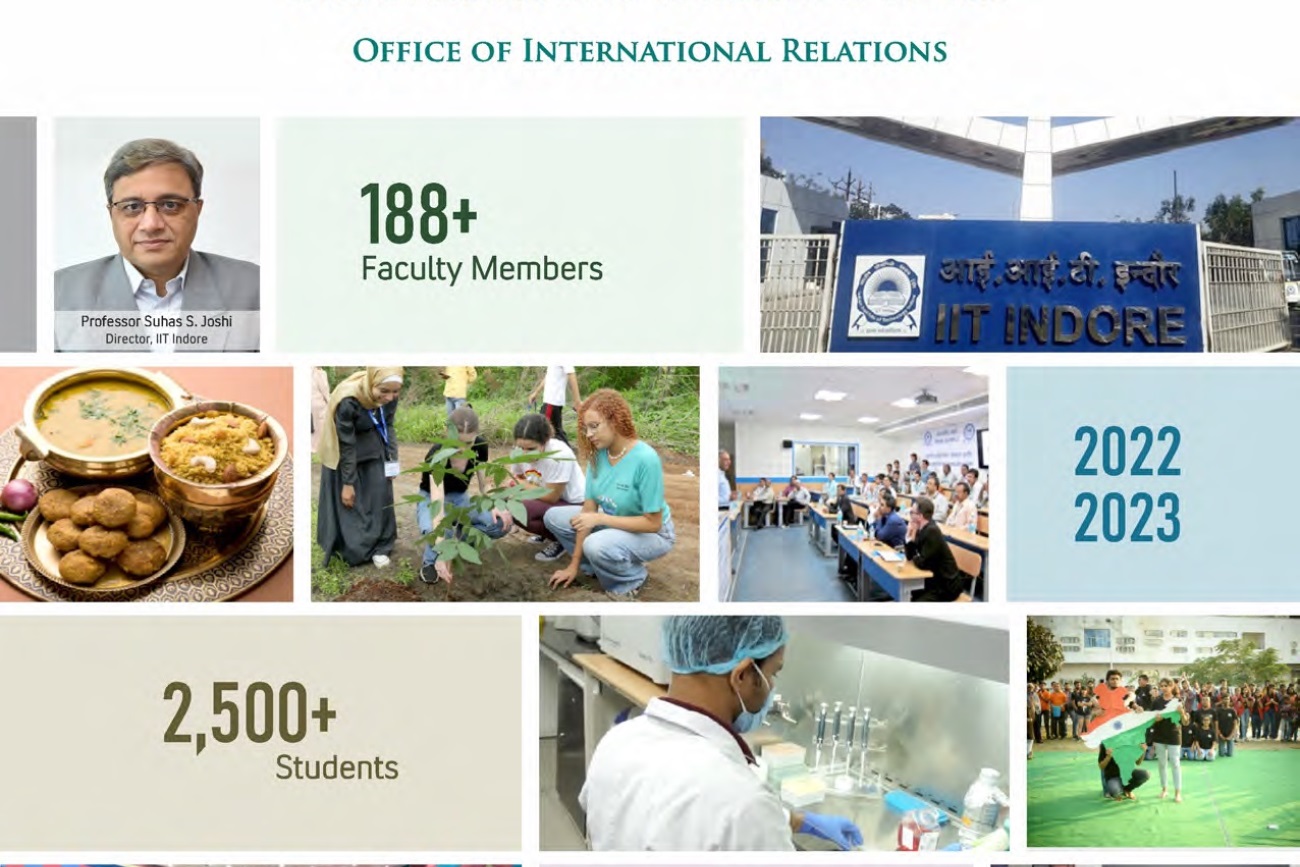
Indian Institute of Technology Indore (IIT Indore), situated in the central part of India in the state of Madhya Pradesh, is an institute of national importance established by the Ministry of Education, Government of India (https://www.iiti.ac.in/_). At present IIT Indore has 11 Departments and 13 Centers of Excellences in Science, Engineering and Humanities offering various UG/PG, Ph.D. programs in diverse fields (https://academic.iiti.ac.in/academic_program.php_. IIT Indore has established state-of-the-art research laboratories, modern lecture halls, on campus accommodation, health center, libraries, Indoor and outdoor sports complex.
Currently, we have 2800+ students and Ph.D. scholars, 200+ highly qualified faculties. IIT Indore has been ranked between 101-150 in Young University Rankings in THE World University Ranking 2023, and 396th QS World University Ranking 2023 with more than 6500 international high impact publications, over 100 technologies and more than 130 patents. We have also established the Advanced Centre for Entrepreneurship (ACE) to foster innovation and entrepreneurship. Moreover, we have signed more than 100 Memorandum of Understanding (MoUs) with various foreign Universities/institutions across the globe.
We are excited to announce that Admissions are now open at IIT Indore for PG and PhD programs for the academic year 2024-25. This provides an excellent opportunity for aspiring international students to pursue higher education in India and broaden their horizons with intercultural programs aimed at offering academic and research exposure.
Students can apply for admission through various programs sponsored by the Ministry of Education, Government of India. These programs include:
- Study In India (SII): The Study in India is a flagship project of the Government of India. The SII program offers scholarships and tuition fee waivers for meritorious students applying to the program. Institutes under the initiative offer from 25% to 100% tuition fee waivers.
Visit the website for more information: https://studyinindia.gov.in/ - Indian Council for Cultural Relations (ICCR): Its objective is to foster and strengthen cultural relations and mutual understanding between India and other countries; to promote cultural exchanges with other countries and people; and to develop relations with nations.
Visit the website for more details: https://studyinindia.gov.in/indian_council_for_cultural_relations_(iccr) and General Announcements for International Students Under ICCR Scholarships: https://iccr.gov.in/announcement - Additionally, students may apply directly under the Self Finance Category. To apply, please send your testimonials and certificates to acaofficer.ir@iiti.ac.in or geeo.ir@iiti.ac.in
Kindly visit the following YouTube page to get more information aboutIIT Indore: https://www.youtube.com/@managerir
General
Mak DARP Project Launch to Revolutionise Management of Academic Records
Published
3 days agoon
April 22, 2024By
Mak Editor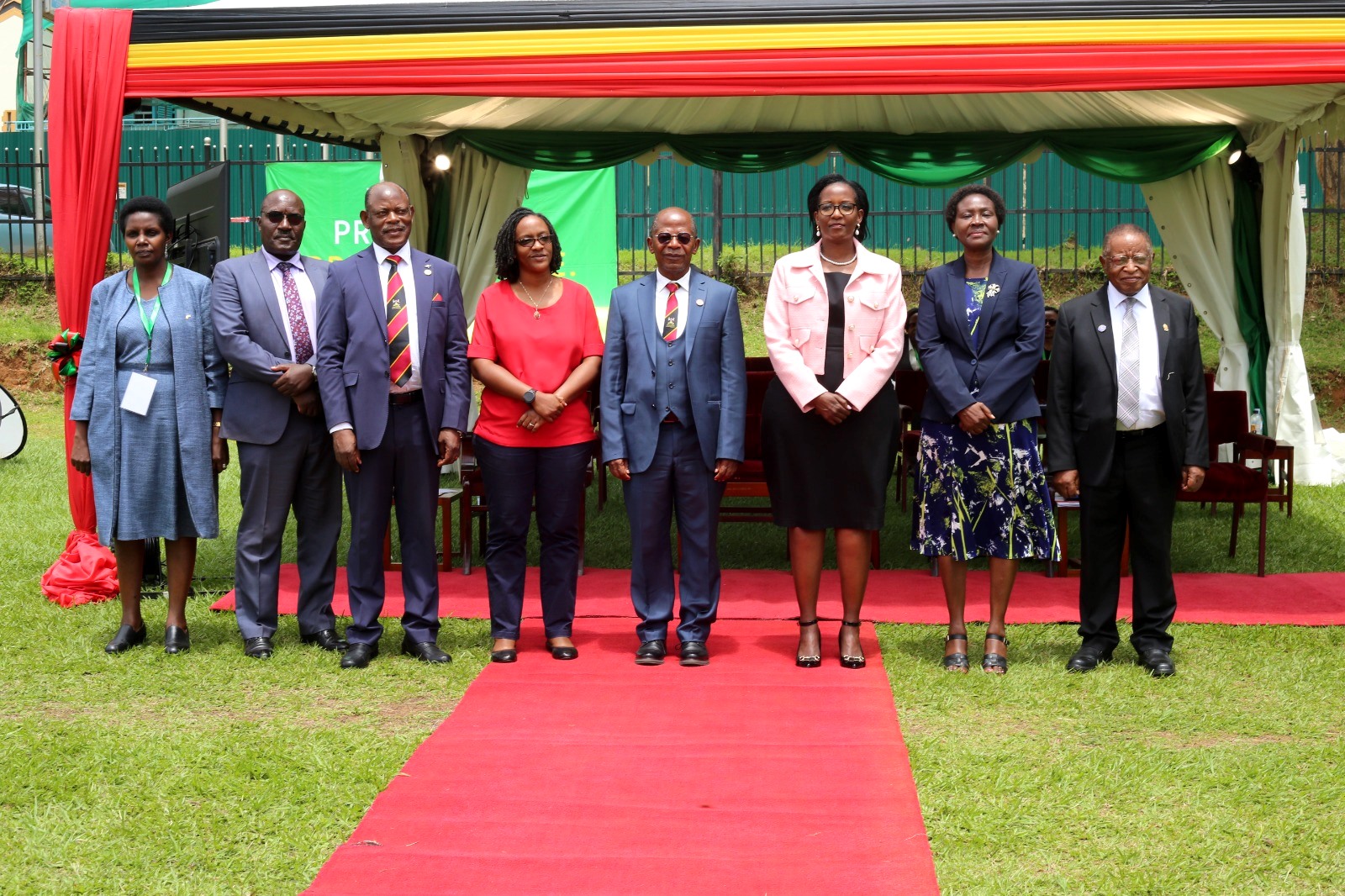
By Ritah Namisango
“This initiative, funded by the Government of Uganda through Makerere University Research and Innovations Fund in partnership with the Mastercard Foundation, represents a significant step forward in our efforts to modernize and digitalize our academic processes. It’s therefore with great pleasure and pride that I launch the Digitalization of Academic Records and Processes project at Makerere University, and I commission the Registry of Students’ Records and the Archive of Students’ Records,” stated the Minister of Education and Sports, Hon. Janet Kataaha Museveni represented by the State Minister for Higher Education, Hon. John C. Muyingo.
As the world continually evolves from manual and traditional methods of records management to modern and digitalized processes, Makerere University launched the Digitalization of Academic Records and Processes (DARP) project to ease the storage, retrieval and acquisition of academic documents by her stakeholders.
The project has digitalized records and implemented new processes as well as established a digital state-of-the-art storage facility at the Senate Building to securely store university academic documents. The digitization process comes along with a university policy that guides on how to record, manage, retrieve and dispose of records not in use. This project is designed to reduce on the substantial amount of space that paper storage systems occupy as well as safeguard records from disasters like fire.
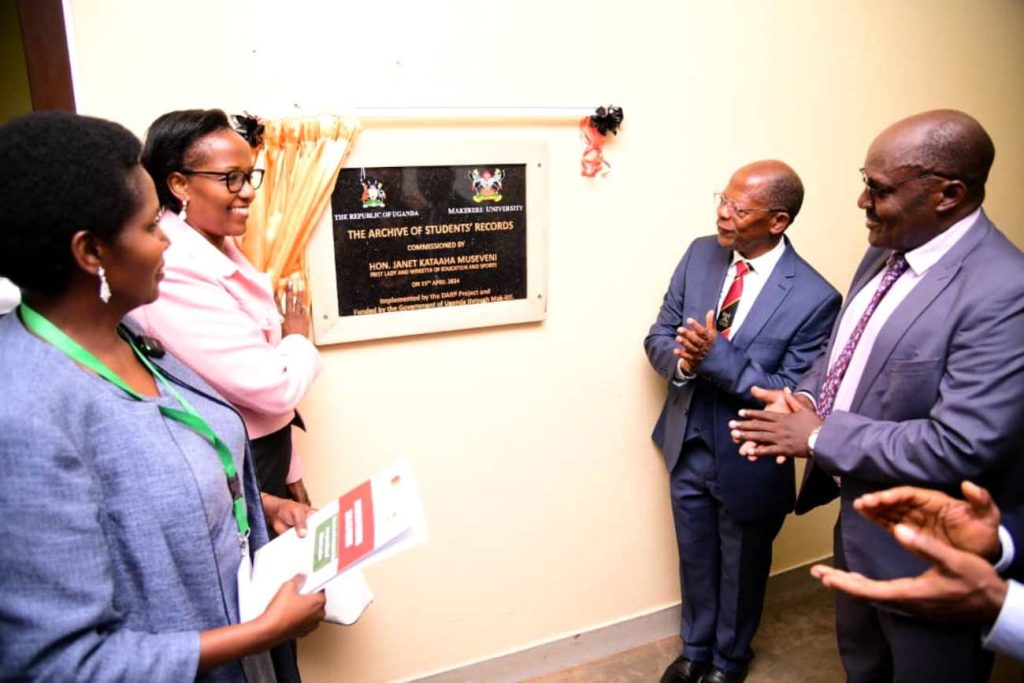
Officiating at the launch of the DARP project on Friday 19th April, 2024 at Makerere University Freedom Square, Hon. John C. Muyingo, affirmed on behalf of Hon. Janet Kataaha Museveni that the launch was a significant milestone in the history of Makerere University.
The Education and Sports Minister further noted that in today’s fast-paced world, universities must manage massive amounts of academic information, and efficient record keeping necessitates that the information is accurate, accessible and secure, benefiting both the institution and its stakeholders. She noted that the DARP system would streamline the processes of managing and accessing academic records, resulting in significant timesaving for students and other stakeholders at the university and beyond.
“Digitalization of academic records and processes is an innovation set to revolutionize the way records are managed by addressing pressing public concerns such as efficiency, security, integrity and accessibility as well as eliminating the unnecessary delays in the processes. The traditional manual approach, while effective in its time has become increasingly challenging to sustain in this digital world, therefore, digitalizing academic records and processes provide crucial responses to the monotonous questions that the outdated manual system never addressed,” stated the Minister’s speech.
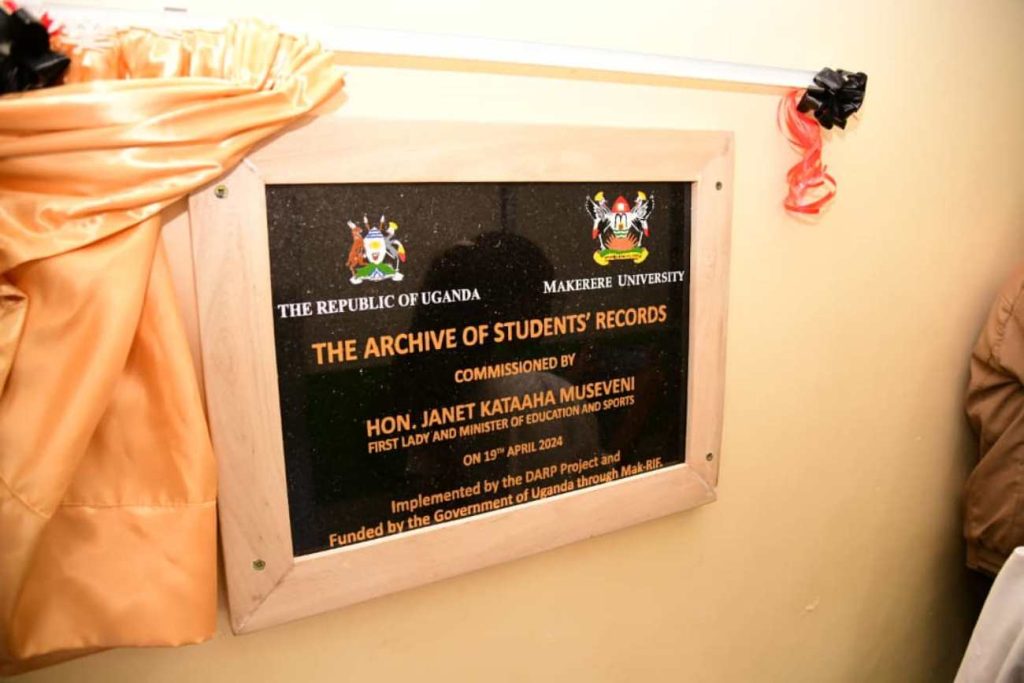
Having outlined the challenges and risks that the traditional paper-based record keeping systems present such as the storage space factor, the risk of mixing active and inactive records, the high rate of wear and tear as well as vulnerability to manipulation of records, the Minister commended Makerere University on the enviable track record of efficiently managing and securely storing its academic documents, Senate minutes, curricula, examination results and students files for nearly a century, despite political upheavals and other challenges.
She observed that digitalized systems would make academic records more accessible to the students and eliminate the frustration of delays caused by bureaucratic inefficiencies and the outdated paper system, enabling them to timely take the necessary steps in academic and professional progression.
As the University embarked on its journey of digital transformation, Hon. Janet Kataaha Museveni equally applauded Makerere for continuously upholding its commitment to academic excellence, research and innovation. She advised the fraternity to stay committed to the principles of innovation and inclusiveness that define the University. As such, she urged them to embrace the digital transformation wholeheartedly so as to harness the power of technology and enable Makerere University to remain a beacon of excellence in the academic world.
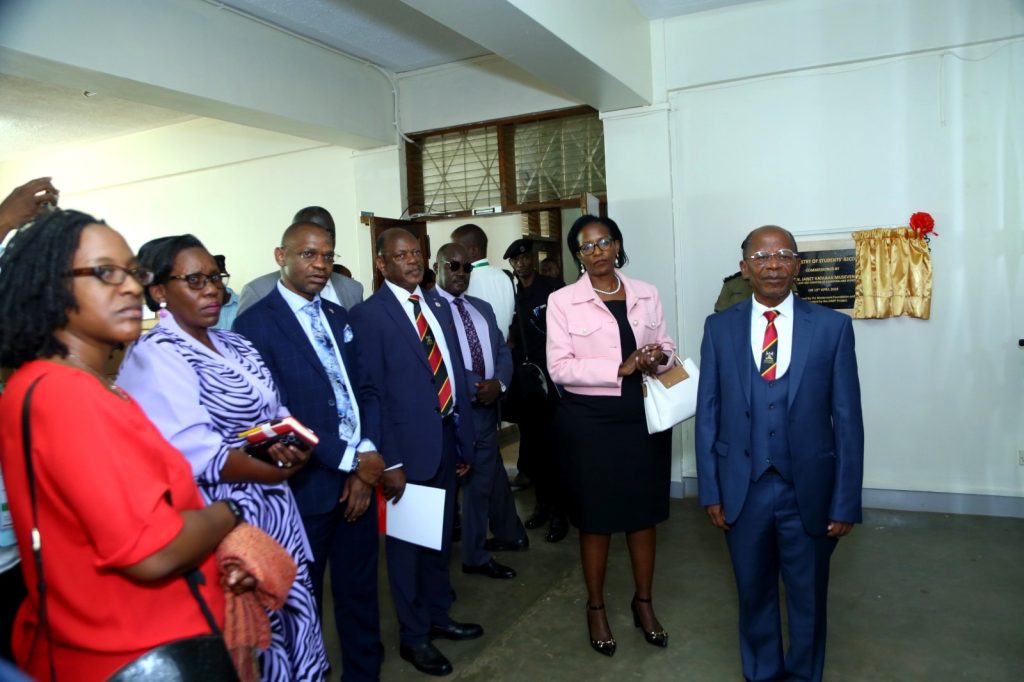
“Since its establishment in 1922, Makerere University has been a beacon of knowledge and learning, shaping the minds of generations of students and contributing significantly to the development of our nation, Africa and the world at large. Thank you for these brains. Your hard work, expertise, and dedication were instrumental in building this DARP project to realization. I am confident that you will have a lasting and positive impact on this university and the entire education sector, not only in Uganda, but the entire world,” said Hon. Janet Museveni.
The First Lady expressed her gratitude for the partnership with Mastercard Foundation and the support it renders in advancing education and innovation at Makerere University.
The Vice Chancellor, Prof. Barnabas Nawangwe highlighted that the launch of the DARP project was not only a landmark achievement for Makerere University, but also a confirmation of the importance that the University Council and Management attach to the role that digitalization and e-services play in implementation of the University strategic plan that continually strives for a professionally managed university.
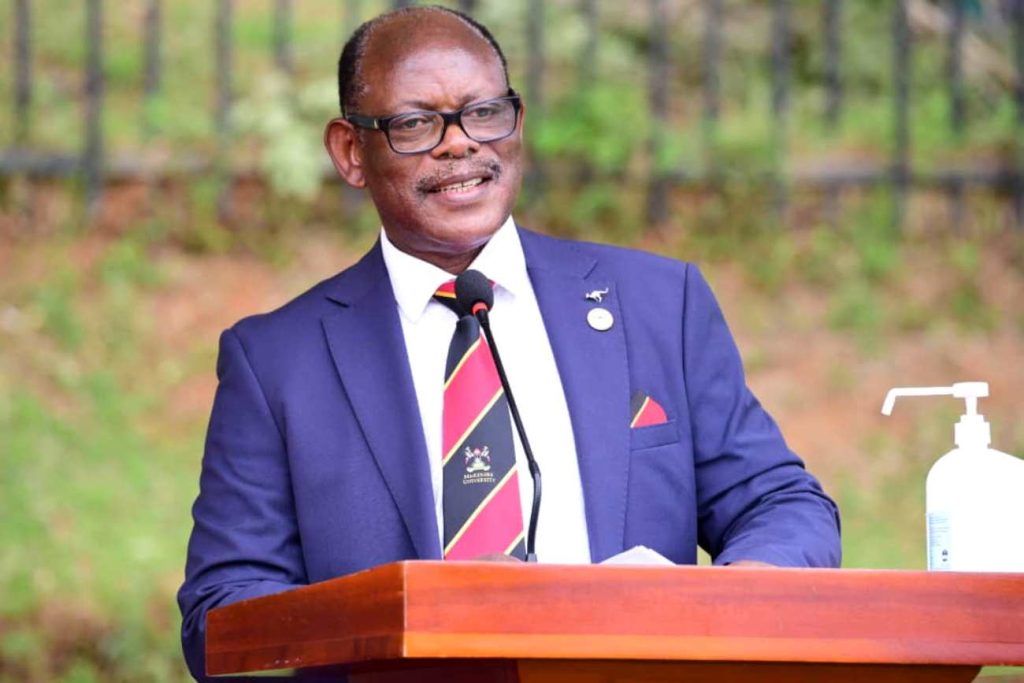
The Vice Chancellor revealed that the official launch of the DARP Project, undertaken in-house by a hardworking team of University staff, was a financial gain on the part of the University and an additional asset in the quest to improve efficiency and effectiveness as far as the University academic records and processes are concerned.
“Our current drive has been the continued digitalization of various business processes and services so as to be more responsive to the dynamic needs of our students, staff and stakeholders. We have been able to achieve this through intentional development of our in-house information systems development capacity, which has saved us a lot of funds in terms of initial purchase as well as annual license renewal costs,” said the Vice Chancellor.
Prof. Nawangwe stated that the DARP project has greatly contributed to the timely and improved service delivery to students and clients. He added that the ultimate goal is to enable students download their own transcripts without need for elaborate physical processes at the university.
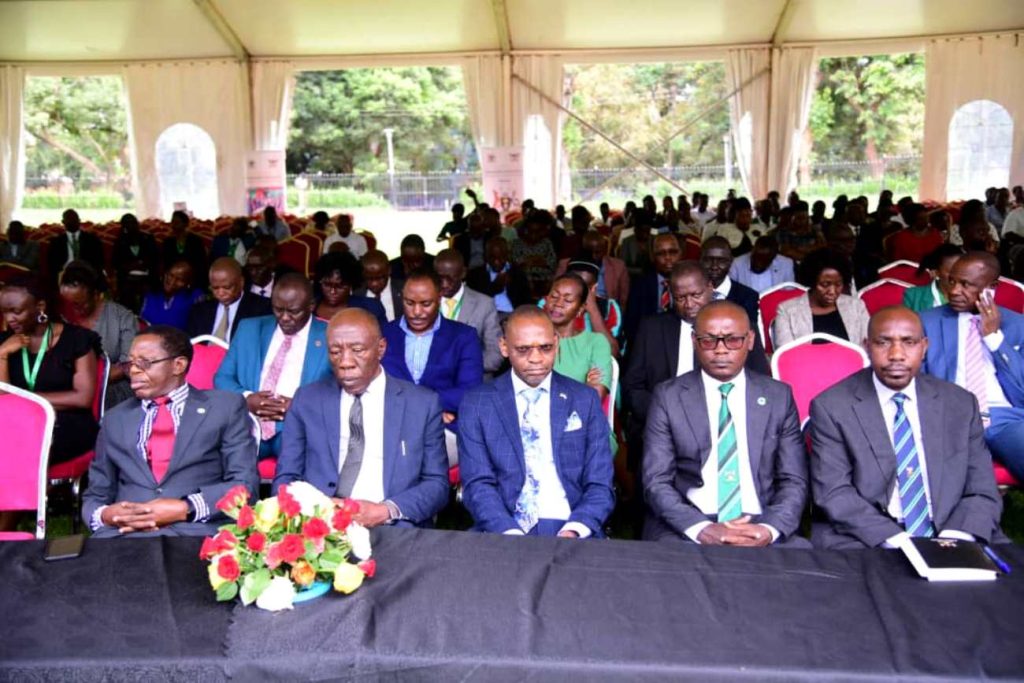
“During the 74th graduation ceremony, Makerere University was able to issue academic transcripts to qualifying students before graduation. I am pleased to inform you that we succeeded in issuing of academic transcripts before the graduation date because of the DARP project, which we are launching today. With the digitalization of students’ academic records, the University is now in a better position to provide the required information and data on time,” said the Vice Chancellor.
Prof. Nawangwe elaborated that Makerere, being Uganda’s Premier University has been a major beneficiary of several initiatives aimed at improving ICT infrastructure and connectivity. He added that the University has been able to achieve this largely due to the generous donations of the Government of Uganda and other development partners. He thanked His Excellency Yoweri Kaguta Museveni, the President of Uganda whose support led to the creation of the Research and Innovations Fund (Mak-RIF) in the 2019/2020 financial year with initial funding of UGX 30 Billion.
He revealed that the funding has continued to be availed throughout the last five financial years, which is clear demonstration that the Government of Uganda esteems Research and Innovation as catalysts to Uganda’s continued march from a peasant to a modern and prosperous country.
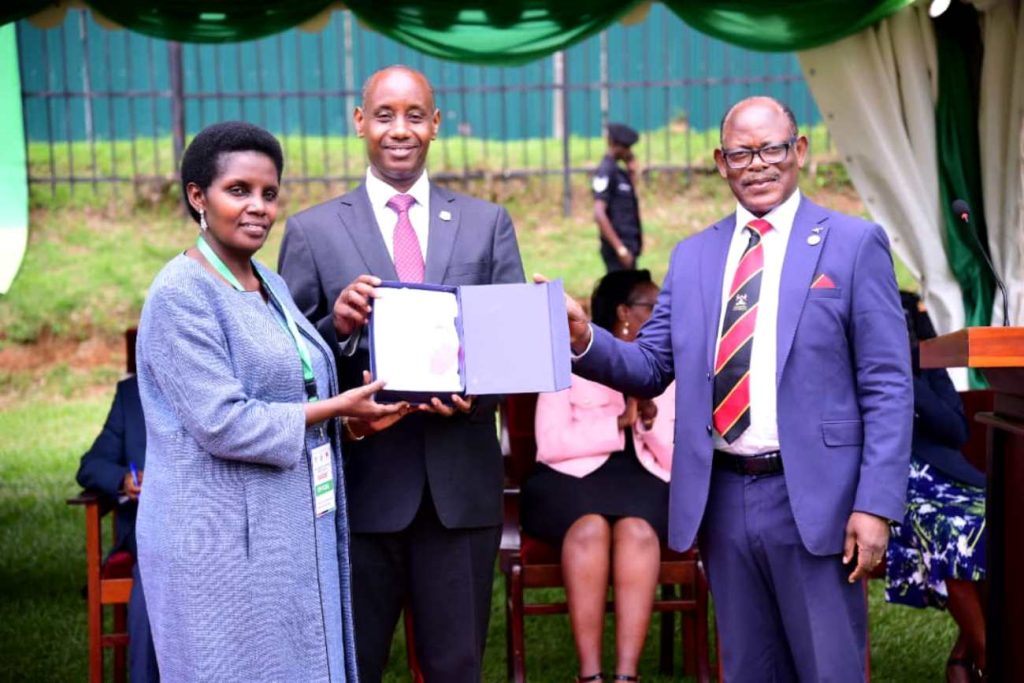
“I am proud to say that Mak-RIF has transformed Makerere’s academic and research landscape tremendously. Over the last five Financial Years, we have worked with other key stakeholders including Government ministries, institutions, agencies, organizations, and the private sector. Together, we have continued to increase the local generation of translatable research and scalable innovations that address key gaps required to drive Uganda’s development agenda, especially the un-funded priorities” stated Prof. Nawangwe.
In the same spirit, the Vice Chancellor applauded the Principal Investigator and Team Leader DARP, Mrs. Patience Rubabinda Mushengyezi and all the Team Members for the hard work that has improved the status of academic records and processes from manual processes to e-services. The DARP project is a collaboration between the Academic Registrar’s Department, College of Education and Externals Studies (CEES), College of Computing and Information Sciences (CoCIS) and the Directorate of Information and Communication Technology Support (DICTS). The DARP Project team includes: Prof. Betty Ezati, Dr. Peace Tumuheki, Dr. David Luyombya, Dr. Joyce Bukirwa, Ms. Ruth Iteu Eyoku, Mr. Juma Katongole, Mr. Joshua Muhumuza and Mr. Lubowa Gyaviira.
The Vice Chancellor also thanked the Makerere University Research and Innovations Fund (Mak-RIF) and the Mastercard Foundation for supporting different phases of the DARP Project.
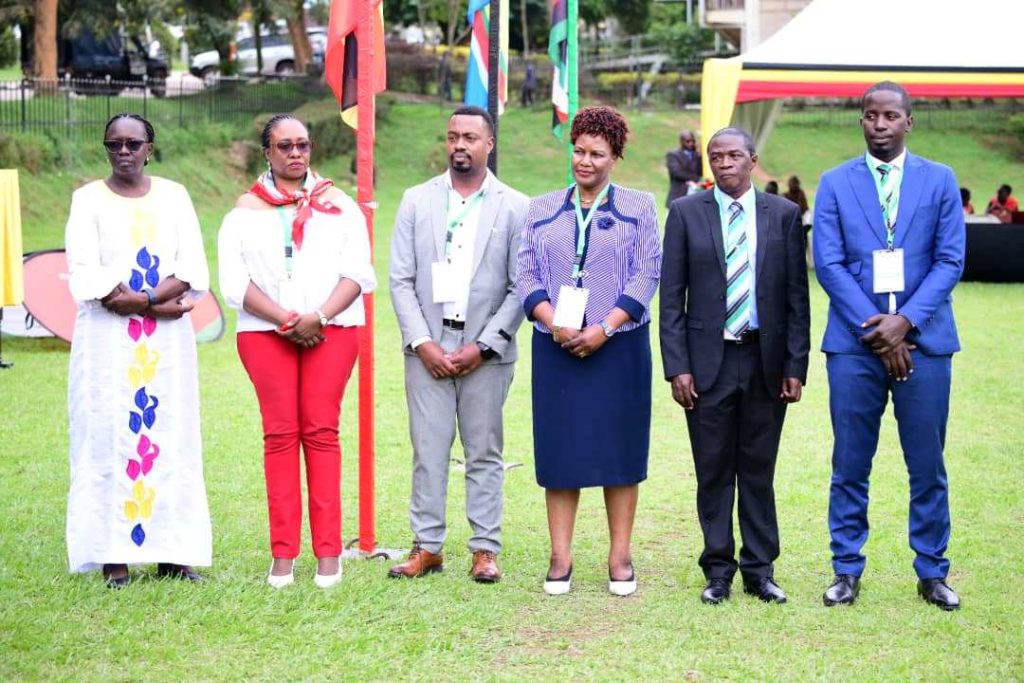
Mrs. Lorna Magara, the Chairperson of Makerere University Council acknowledged that launching the DARP project at Makerere University marked a significant step forward in digitalizing higher education services. She underscored that the transformational power of digitalization could not be overstated. She stated that by implementing an Academic Records Management System, the University would streamline the tracking and retrieval of academic files and establish a robust platform for digital certification and record verification.
“In an era where credential fraud poses a significant challenge, the DARP Project reinforces transparency, trust, and confidence in our academic processes. It is testament to our commitment to excellence. The DARP Project heralds a new era; one where our certificates and transcripts are shielded against increasingly sophisticated forgeries. By providing digitally verifiable academic documents, we empower employers worldwide to expedite verification procedures,” she articulated.
The Chairperson stated that Makerere University aims to create a dynamic and integrated learning environment with a goal to equip students with the skills and knowledge needed to thrive in an ever-evolving world. She emphasized the need to prioritize student-centeredness and adaptability which vision perfectly aligns with the DARP Project to ensure that the most deserving students can compete fairly in the job market alongside genuinely qualified candidates.
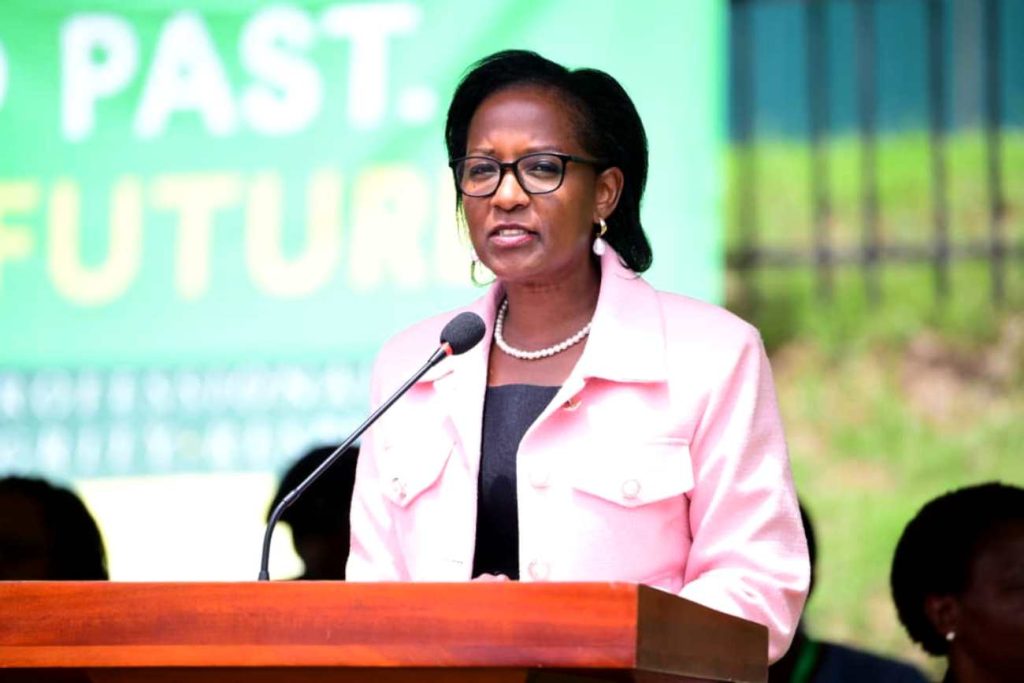
She advised that a system’s effectiveness hinges on the quality of input it receives, therefore, meticulous attention to detail is essential to ensure that the necessary information is accurately fed into the system to yield the expected outcomes. She recommended that vigilant effort has to be invested in ensuring quality processes in how the information is gathered and fed into the system, and the quality of persons tasked to do the work.
Mrs. Magara praised the DARP Principal Investigator for initiating the project in support of the University’s efforts to; address the critical element of maintaining integrity of academic records, significantly contributing to the University’s commitment to digitizing systems, and upgrading the process of archiving of records for ease in verification, certification, and retrieval.
She also extended appreciation to the Government of Uganda for the provision of funds through Mak-RIF, and to Mastercard Foundation for the provision of equipment and other support that will facilitate safe processing and storage of the academic documents.
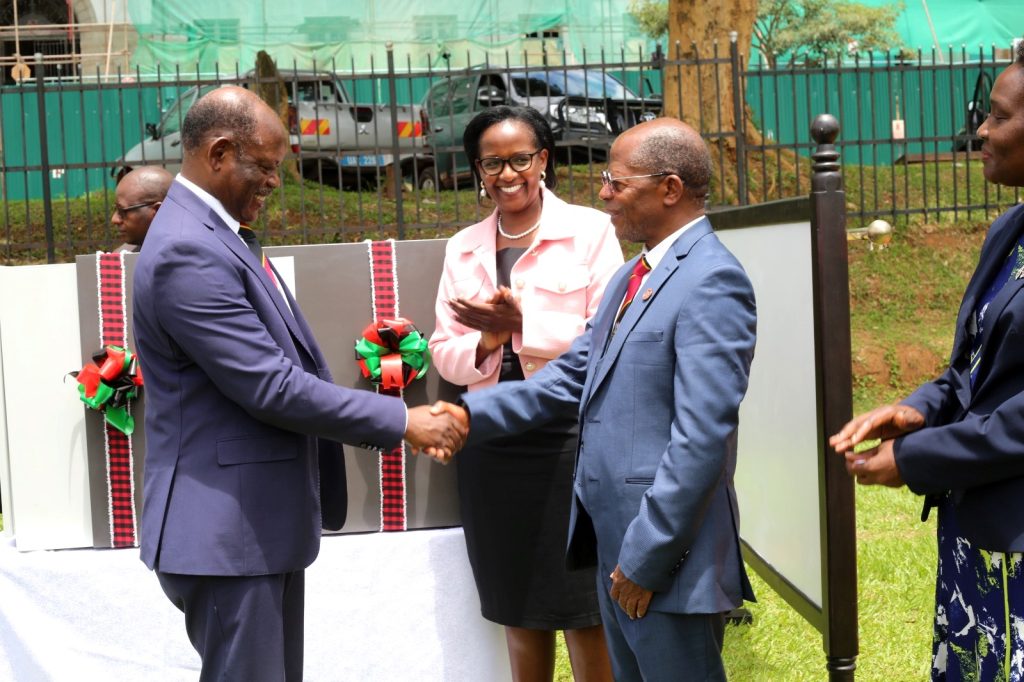
The Principal Investigator and Team Leader, DARP project, Mrs. Patience Rubabinda Mushengyezi proclaimed that the launch of the project was the birth of a new era in records management at Makerere University.
To enable the audience to understand and appreciate the situation before the DARP project, Mrs. Mushengyezi shared a documentary that highlighted the transformation from a purely manual process to a digital one. She added that the digitalization of student records from the 1980s changes the narrative of delays and long queues to fast, timely and friendly services to the students.
The Principal investigator disclosed that the DARP project team’s aspiration was to have the digitalization of students’ records rolled out in all the schools and colleges of the University. She observed that because of the hard work of the DARP team, they now have clear and well organized documents and the ‘ugly’ records shall never be seen again since they no longer exist. She expressed gladness that what started as a vision had become reality, culminating in the launch of the DARP project.
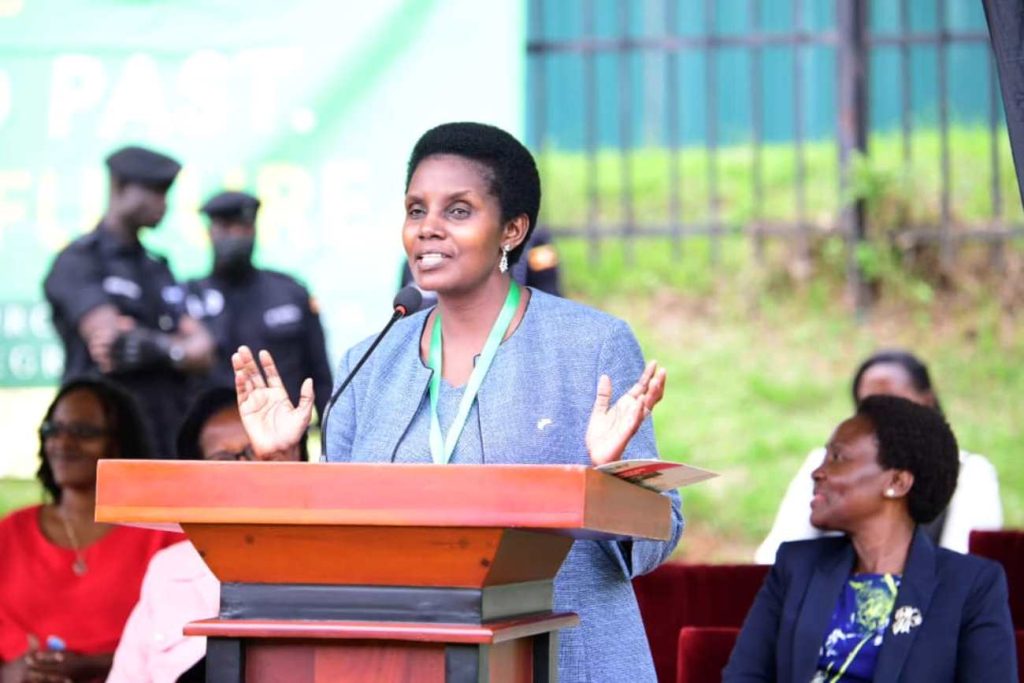
“Today, Makerere University is launching a new era of digital transformation in the management of students’ records and service delivery. We are changing the narrative of long queues, lengthy processes and we are now moving to efficient and digital services. We are here also to commission the registry of the students’ records and archive. The registry has been fitted with modern shelves with the capacity of storing over 30,000 students files but as we have seen, there is room for improvement and expansion. The archive has been fitted with modern shelves that have a capacity of storing over 100,000 students’ files and 21 wagons will store 170,000 students’ files,” Mrs. Mushengyezi declared.
Recalling the genesis of the DARP Project, Mrs. Mushengyezi shared that when the Government allocated support to the university’s research and innovations fund in 2019, she approached her colleagues and together, they submitted a project proposal. The project identified several challenges which were affecting records management at Makerere University namely; manual records handling, inadequate storage space, inadequate security for records, inexistent policy on records management, and lack of a system to streamline records management. The DARP project therefore set out to address these gaps with the ultimate goal of operating e-services.
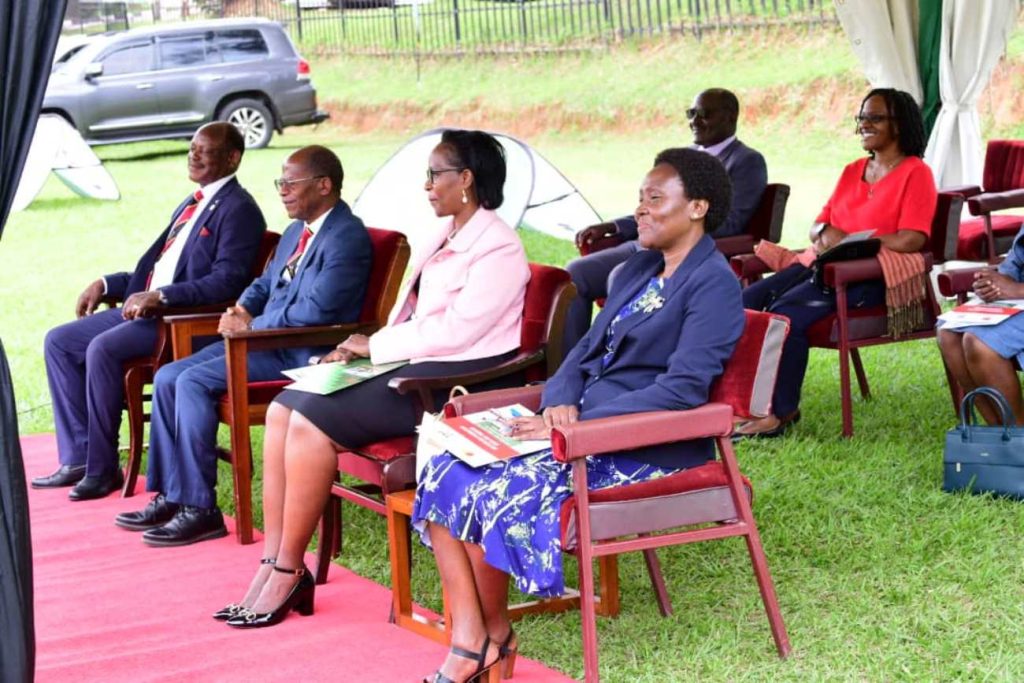
“The objectives of DARP Project were to digitalize academic processes including students’ files and examination results and other documents like senate minutes. We wished to establish a students’ records verification and certification Centre. We also wanted to use ICT to improve efficiency in conducting senate meetings and to archive existing manual documents into properly bound and referenced files. It has been a lot of hard work by the project team, but we have seen God’s hand in this transformational journey. I wish to say that we have achieved 95% of our objectives,” Mrs. Mushengyezi stated.
The Principal Investigator noted that the DARP project had created efficiency in the academic Registrar’s department with ability to generate reports on number of students by categories such as course, graduation cohort, academic disciplines i.e. Medicine, Law, Engineering etc., current enrolment and progression, as well as policies passed by the University Senate per year, and so on.
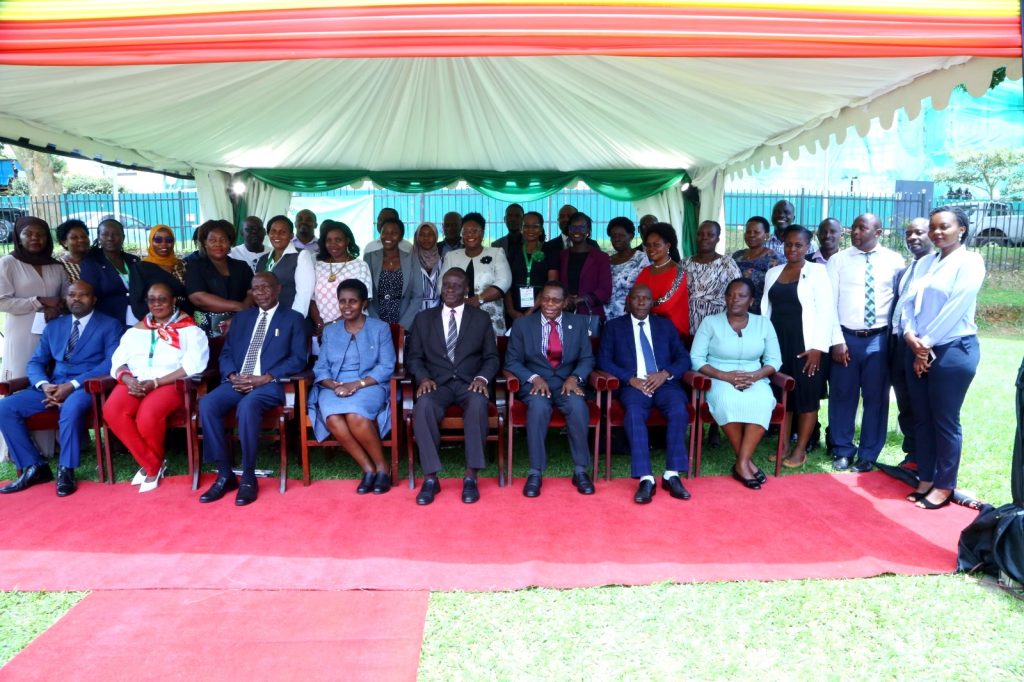
She thanked the Government of Uganda for funding the entire process by providing laptops, access control systems, CCTV cameras, printers, furniture, archival boxes, the 21 shelves, the wagons, stationery and facilitation of the entire team. She also thanked Mastercard Foundation for the support through the relief fund.
She appreciated the entire Makerere University Council and Management for the support rendered towards the establishment of the DARP project and for prioritizing the Project as a university programme. In a very special way, she acknowledged Prof. William Bazeyo, the former Deputy Vice Chancellor (Finance and Administration), Prof. Fred Masagazi Masaazi-Chairperson of Mak-RIF Grants Management Committee (GMC), Prof. Umar Kakumba, Deputy Vice Chancellor (Academic Affairs), Mr. Alfred Masikye Namoah, former Academic Registrar and the Academic Registrar, Prof. Buyinza Mukadasi, the University Secretary, Mr. Yusuf Kiranda, Deputy Registrars namely Mr. Charles Ssentongo and Mr. Tom Otim, for providing tireless support.
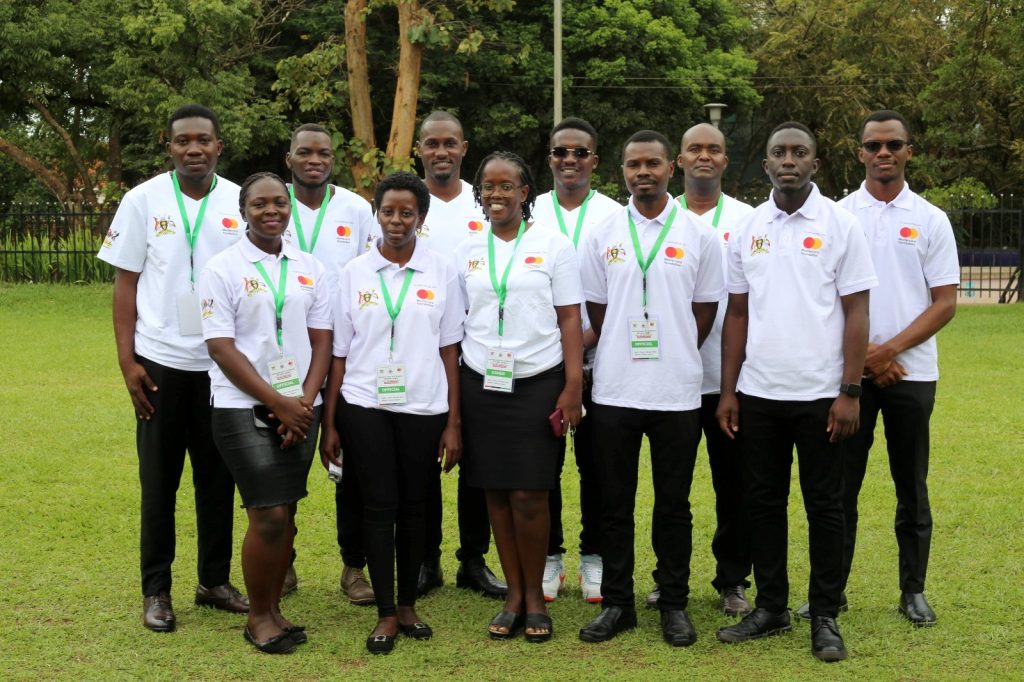
In addition, she recognized the supervisors in the Directorate of Research and Graduate namely Prof. Edward Bbaale and Ms. Prossie Nakayiki.
The Principal Investigator, Mrs. Mushengyezi also appreciated the members of staff whom she referred to as DARP Foot Soldiers for organizing, sorting and scanning the records.
In recognition of her selfless service and leadership, the DARP project team members through the Vice Chancellor, Prof. Barnabas Nawangwe presented Mrs. Patience Mushengyezi with a plaque and bouquet of flowers.
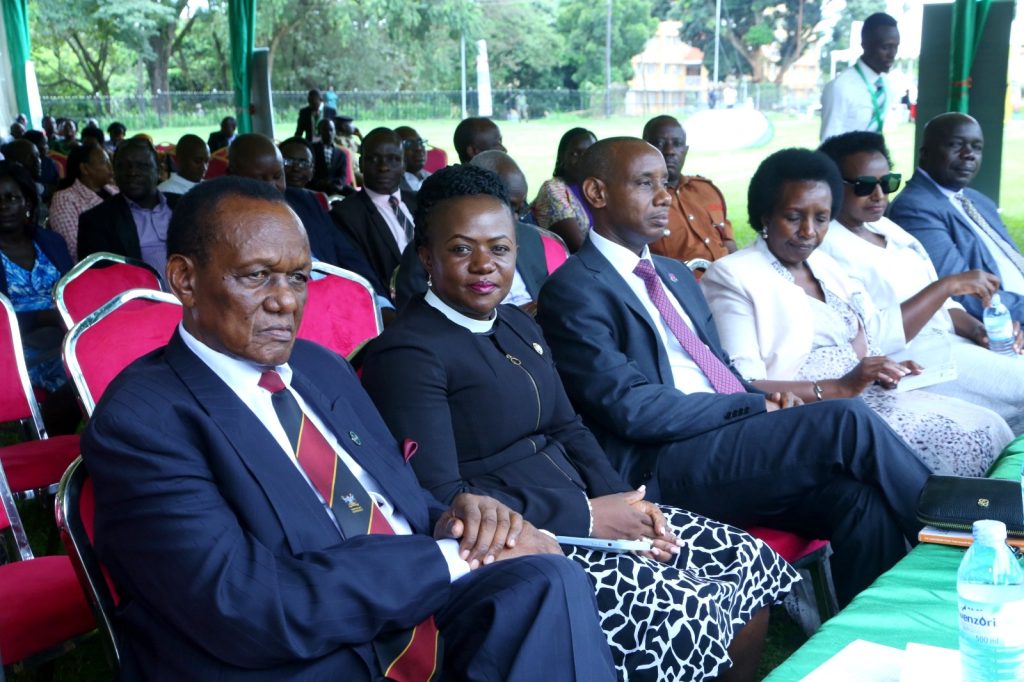
The DARP project launch was graced by the Chancellor Emeritus, Prof. Ezra Suruma, Members of Parliament, Vice Chancellors of other Universities, former Vice Chancellors, former Deputy Vice Chancellors in charge of Finance and Administration, the Makerere University Students’ Guild, and Mrs. Mushengyezi’s family. The Chaplain, St. Francis Chapel, Rev. Dr. Lydia Nsaale Kitayimbwa led the opening prayer while the event was moderated by Dr. Zahara Nampewo, the Deputy Principal of the School of Law and Ms. Ritah Namisango, Principal Public Relations Officer and Chairperson of the Protocol, Publicity and Media Sub-Committee for the launch. The Department of Performing Arts and Film was on hand to lead the anthems and keep the guests entertained.
General
Mak holds Mental Health Awareness Campaign for International Students
Published
3 days agoon
April 22, 2024By
Mak Editor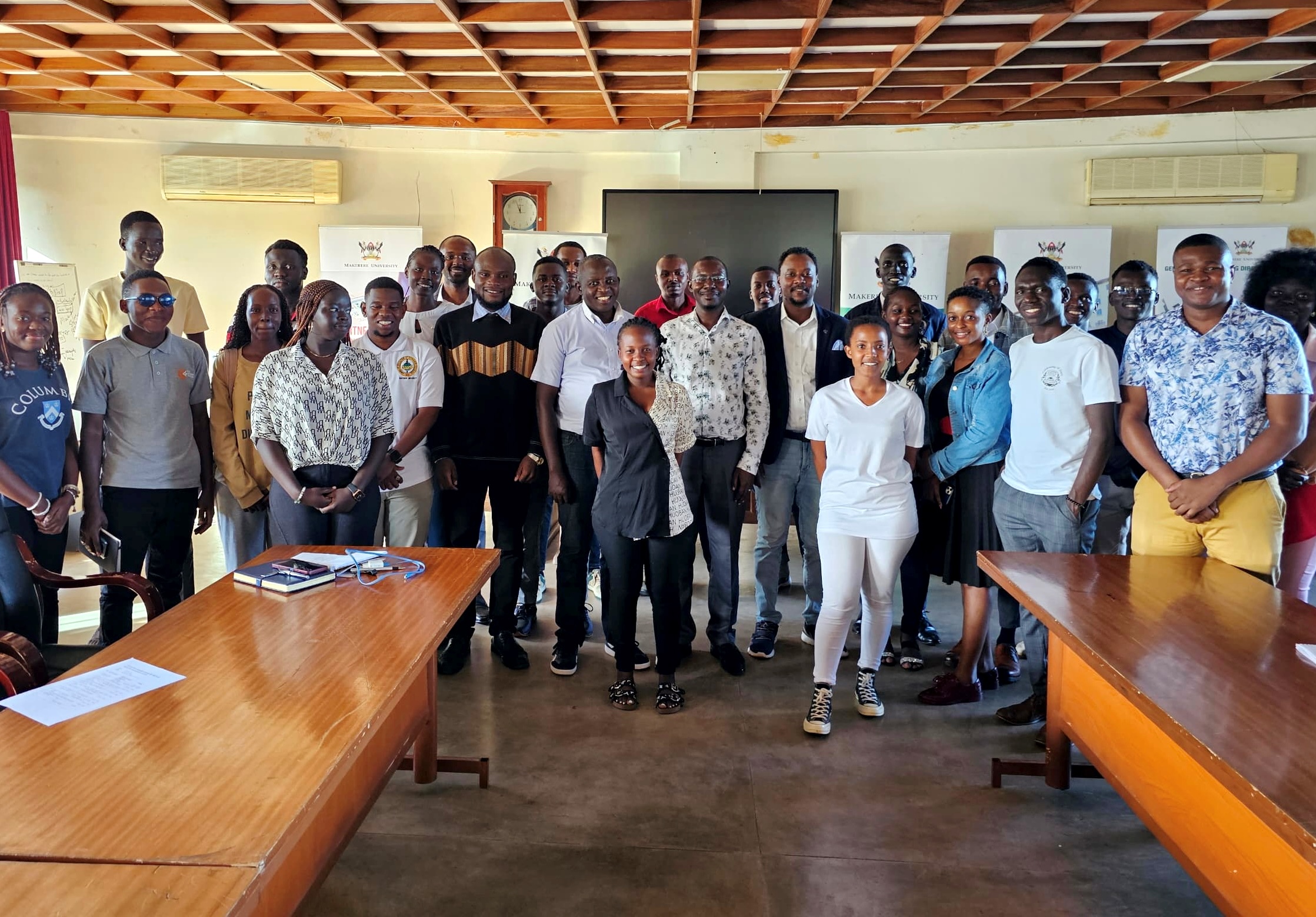
By Betty Nabisubi
On Friday 12th April 2024, over 100 international students convened at Makerere University to participate in the Mental Health Awareness Campaign organized by the International Students Union in partnership with the Counselling and Guidance Centre, International Office and Office of the Dean of Students.
The campaign, which included both physical and virtual participants, rallied international students to always ask for help. The annual event enables students to participate in engaging discussions, and provides a platform for them to openly share and address personal and academic challenges, both on and off campus.
The aim of holding a mental health awareness campaign for international students in the university is to promote mental well-being and provide support and resources for students facing mental health challenges. Furthermore, it seeks to raise awareness about common mental health issues, reduce stigma surrounding mental illness, and educate students on available mental health services and support networks. Additionally, it aims to empower students to recognize signs of distress, encourage help-seeking behavior, and foster a supportive and inclusive campus community where students feel comfortable discussing mental health concerns.
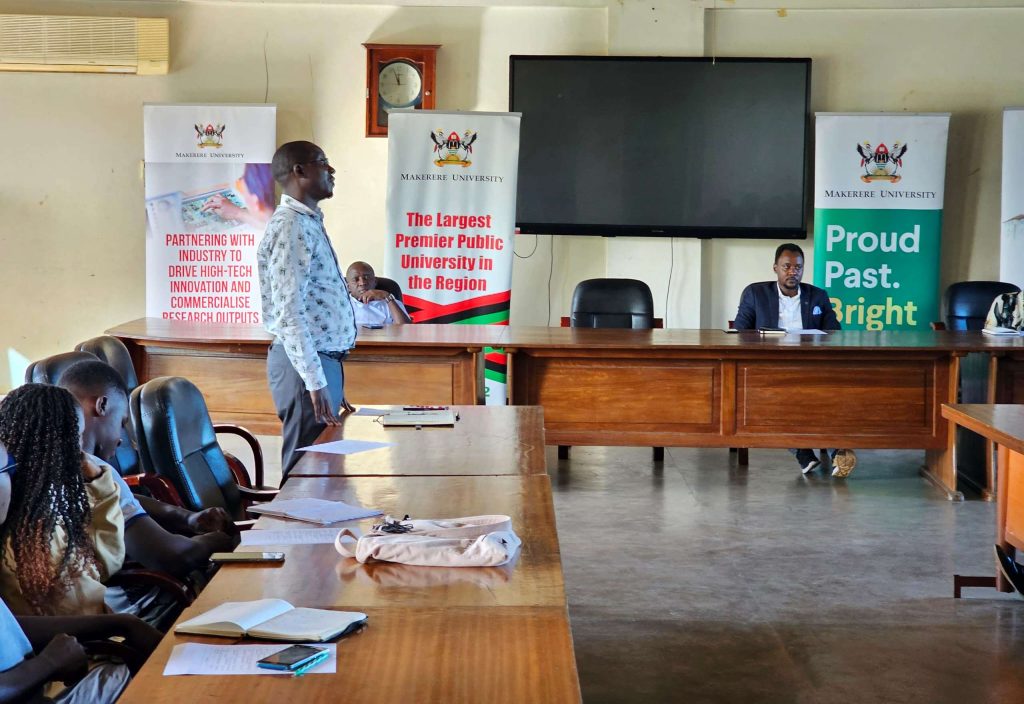
In line with the Mental Health Awareness Campaign theme; It is ok to ask for help, each Official urged the international students to seek guidance and support from the right offices and entities within the Makerere University system.
The Office of the Dean of Students represented by Mr. Peter Mwanja, Warden of University Hall emphasized the importance of students seeking help rather than isolating themselves in their hostels when faced with problems. He urged students to refrain from complaining about lack of assistance, but instead take action by speaking up when faced with challenges. Mr. Mwanja pledged to stand with the students throughout their academic journey so as to ensure that they have a fruitful stay at Makerere University.
In the same spirit, the Manager of the Makerere University Counselling and Guidance Centre, Mr. Henry Nsubuga called upon international students to utilize their services. He appealed to students to seek for help whenever they feel distressed.
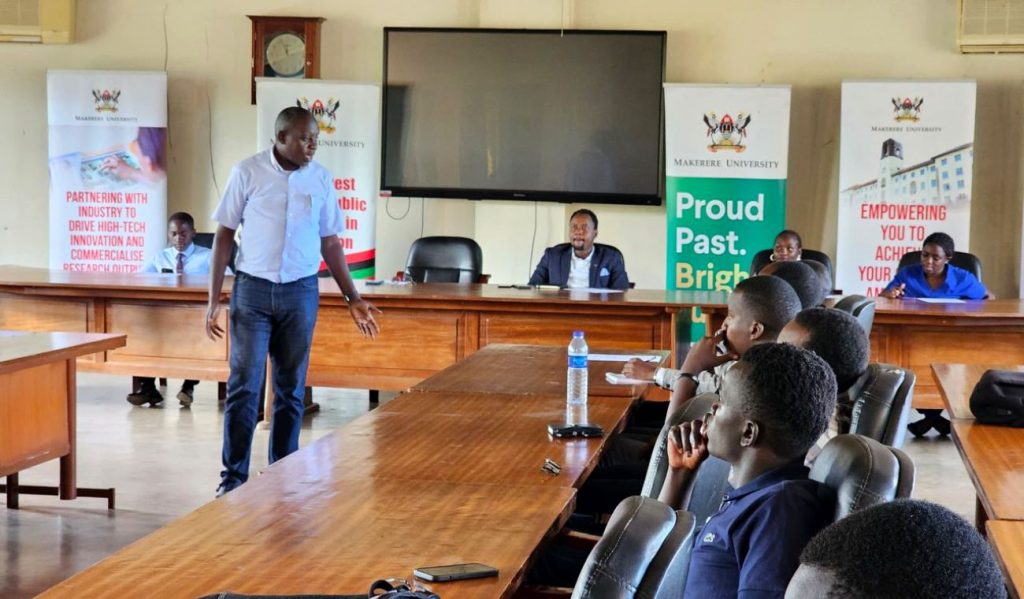
“Please come to the Centre when you need help. The Centre is ready to provide assistance upon any distress signal. I assure you that nobody will judge you for not being okay. We have professional counsellors who are willing to help,” remarked Mr. Nsubuga. The Makerere University Counselling and Guidance Centre is conveniently located at Plot 106, Mary Stuart Road, opposite Mary Stuart Hall.
Dr. Gardner Herbert from the Julius Nyerere Leadership Centre at Makerere University emphasized the importance of emotional intelligence, which encompasses the ability to understand, manage, and express one’s own emotions effectively, as well as to recognize and respond appropriately to the emotions of others. He highlighted the significance of students possessing skills such as self-awareness, self-regulation, social awareness, and relationship management.
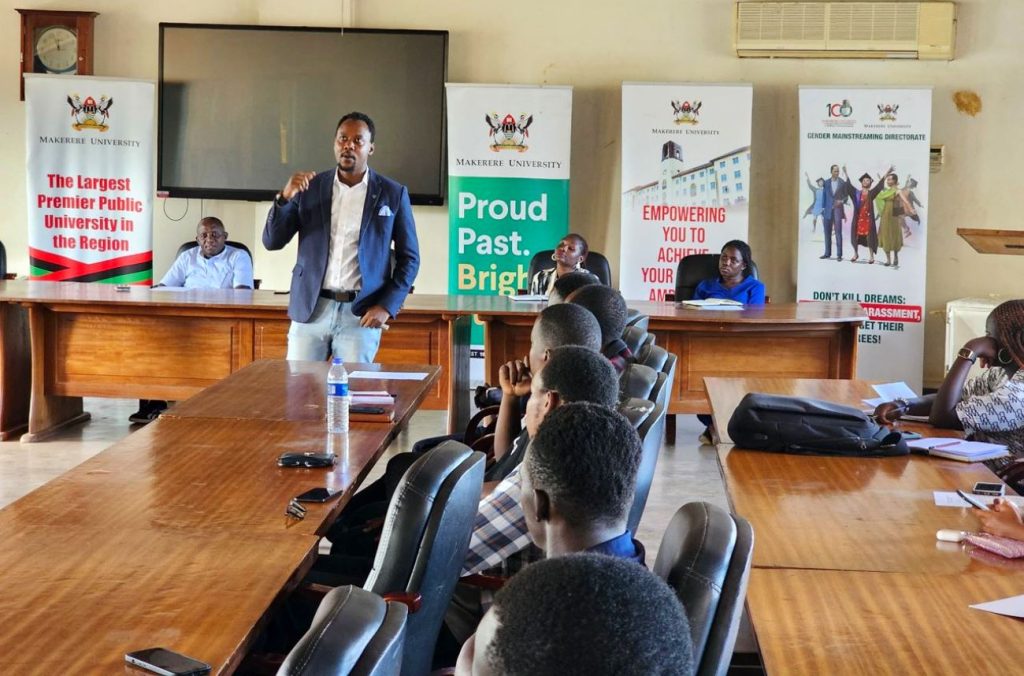
Self-awareness, he emphasized, serves as the foundation of emotional intelligence. This involves recognizing and understanding one’s own emotions, strengths, weaknesses, values, and motivations. Dr. Gardner explained that ndividuals with high self-awareness are better equipped to comprehend how their emotions influence their thoughts and behaviors, leading to more informed decision-making and greater self-control.
Mr. Gerald Ochwo on behalf of the Makerere University International Office encouraged the audience to visit the premises on Flat A5, Block A, Lincoln Flats for their mandate is anchored on ensuring that International students’ university experience is enriching. Furthermore, he emphasised the importance of students managing their visas proactively, instead of rushing to renew them either at the last minute or upon expiry. He pledged to organize more events to foster relationships among students.
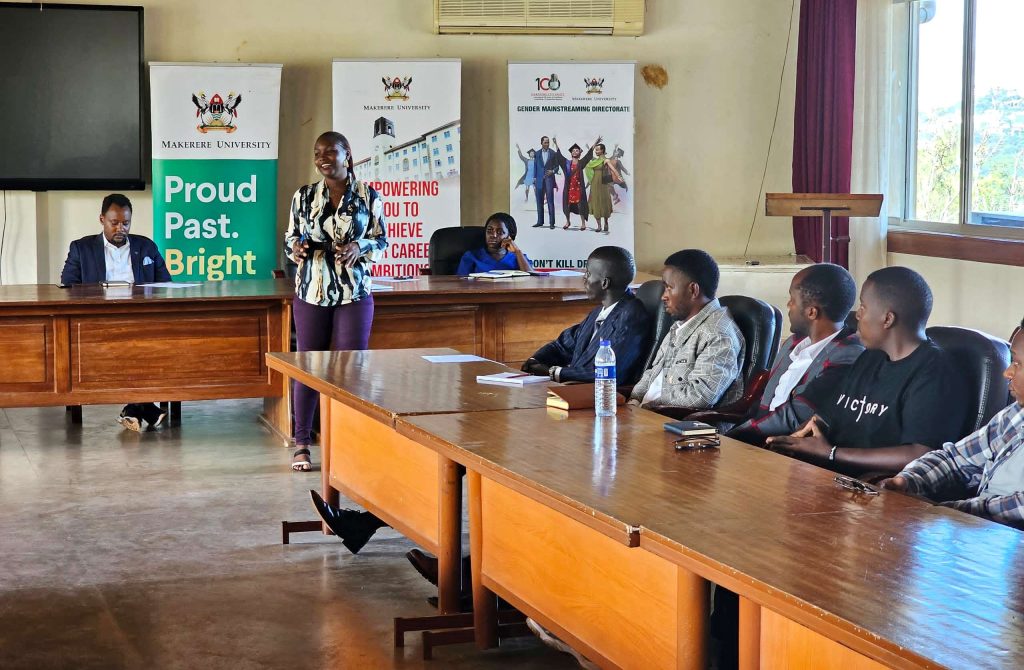
Focusing on nurturing a supportive environment for students away from home, the International Office invited Ms. Olivia Mwanje, a student of Makerere University pursuing a Master’s degree in Climate Change and Development at the College of Agricultural and Environmental Sciences to share a lived experience.
Ms. Mwanje was one of the beneficiaries of the exchange students’ programme to Utrecht University in the Netherlands. Her testimony served to demonstrate to international students that with dedication and sacrifice, it is possible to leave one’s home country, study abroad, and excel both academically and personally. She encouraged students to remain focused on their academic programmes despite the allure of other pursuits.
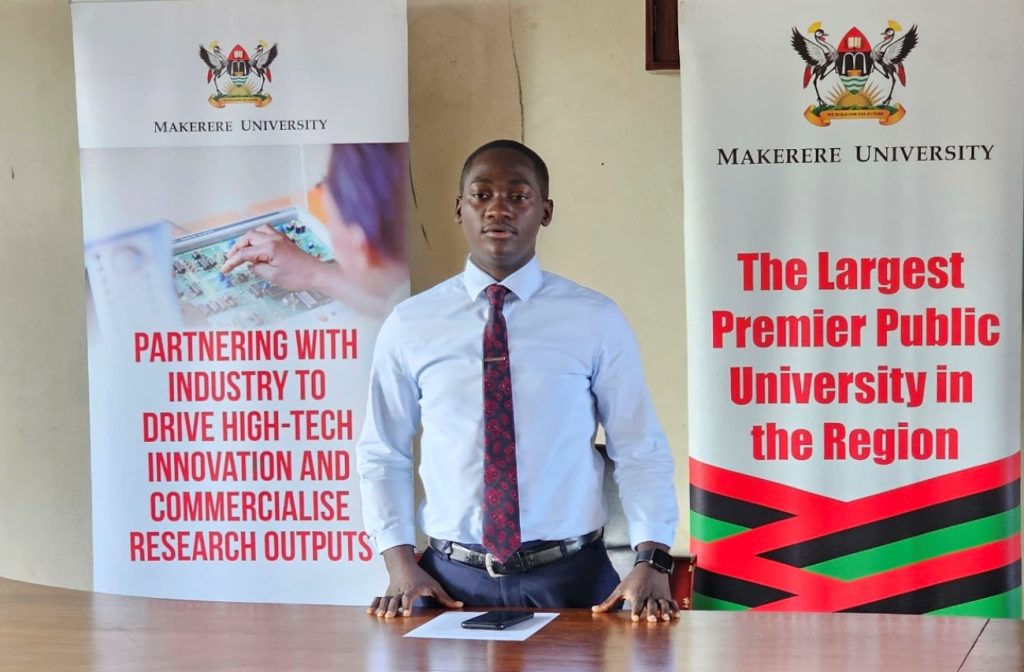
“I urge you, fellow students, to remain steadfast in your educational aspirations while exploring the opportunities available. Prioritize your academic goals over non-academic pursuits,” said Ms. Mwanje. She stressed that deviating from the primary objective leads to unintended consequences. For instance, she shared stories of students who abandoned their academic pursuits for menial jobs upon arrival abroad. Ms. Mwanje advised students to stay committed to their studies and, upon completion, pursue other non-academic endeavors if they so desire.
The Guild President, H.E. Vincent Lubega Nsamba expressed the Guild Leadership’s strong commitment to ensuring that international students have a comfortable stay at Makerere University. He encouraged international students to seek counselling whenever they feel distressed and emphasized the importance of talking to peers for support.
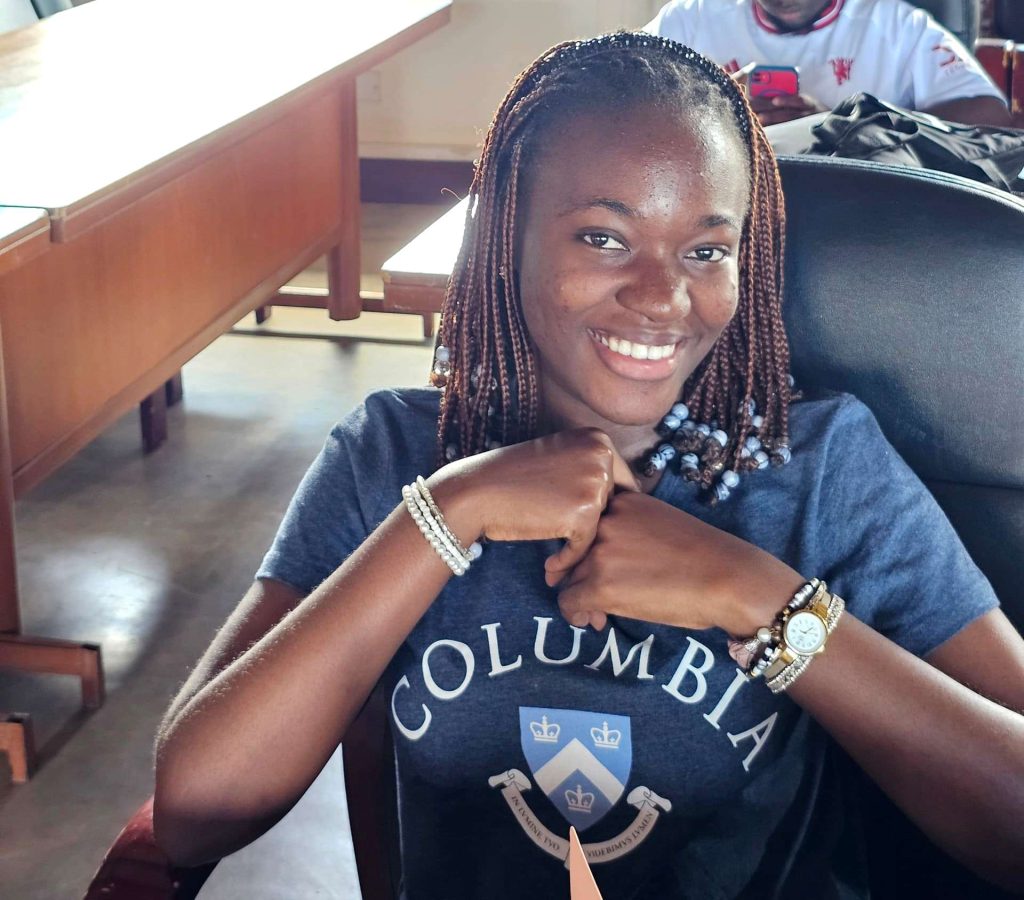
One of the international student leaders, Mr. Harrison Igwe expressed enthusiasm for organizing activities that promote unity within the international student community at Makerere University. The goal of the activities, he said, is to enhance camaraderie and strengthen support networks among international students.
Trending
-
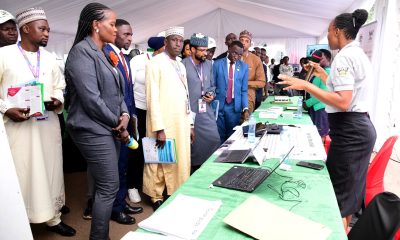
 Computing & IS1 week ago
Computing & IS1 week agoFree Course: Introduction to Data Science
-
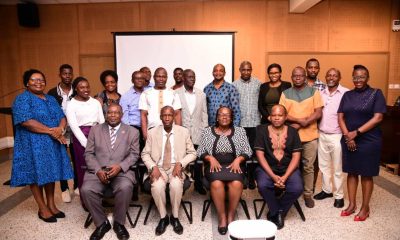
 Education6 days ago
Education6 days agoGovernment Asked to Make Fine Art Compulsory in Secondary Schools
-
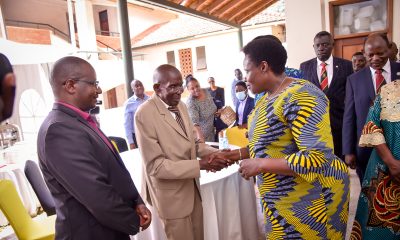
 General1 week ago
General1 week agoProf. Justin Epelu-Opio, Our Longest Serving DVC Rests
-
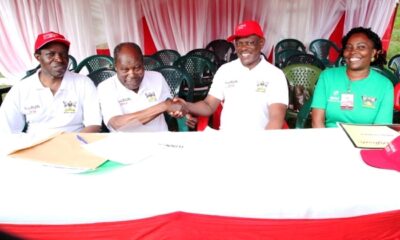
 General1 week ago
General1 week agoDr. Martin Aliker – Celebrating A Life Well Lived
-
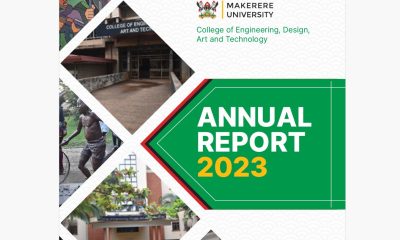
 Engineering, Art & Tech2 weeks ago
Engineering, Art & Tech2 weeks agoCEDAT Annual Report 2023
